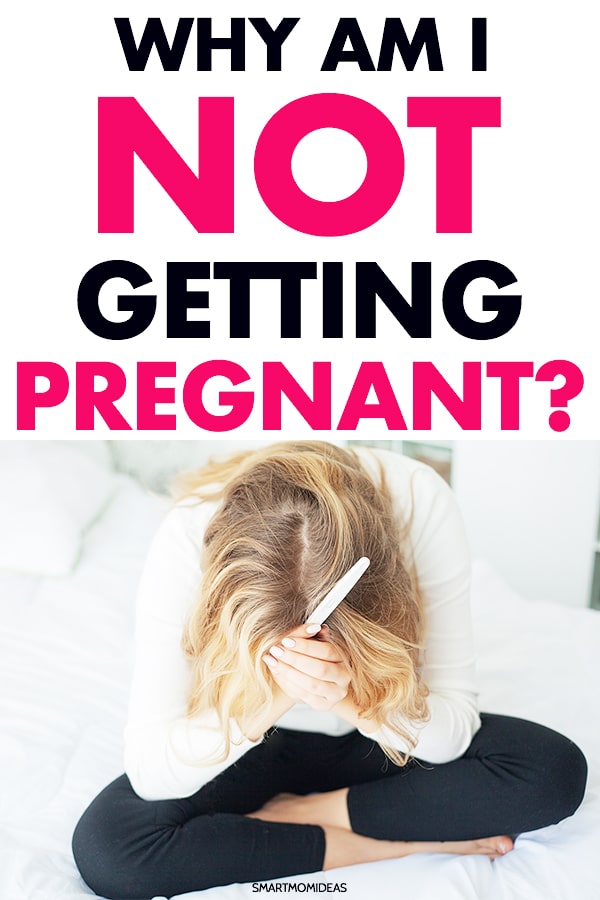Learn why you aren’t getting pregnant!

You have finally decided to have a baby.
You’ve tracked your period and you have had sex on all the right day.
No matter how many tests you have peed on, it just doesn’t ever seem to come up with a positive result.
When you are actively trying for a baby, this can be one of the most frustrating things ever.
This was my journey for getting pregnant. I had a very difficult time and had to resort to doing IVF to get pregnant.
Knowing some of the reasons why you might not be getting pregnant can help you to increase your chances.
1. Not Ovulating
Simply put, if you are not ovulating, you will not get pregnant.
All pregnancies begin with an egg and a sperm. Conception starts when the egg is fertilized by the sperm, which can only take place when the woman is ovulating.
No ovulation equals no egg.
Women experience the absence of ovulation for many reasons.
This can include reproductive issues such as PCOS, dysfunctional thyroid, being underweight or overweight, and/or excessive exercise. Just because you are experiencing regular menstrual cycles, you may still be having issues with ovulation.
If you have been trying to conceive for a year and or having irregular periods, you should contact your doctor about your options.
2. Male Infertility
It is not uncommon for men to experience infertility issues.
As much as 30% of couples who have issues conceiving have found that it is due to infertility factors in the male partner.
In order to diagnose male infertility issues, it is best to have a sperm analysis done to see what your doctor suggests. There are many potential issues that can affect male infertility such as sperm potency, problems with sperm movement, and other sexual related problems.
His BMI (Body Mass Index) can also have an effect on sperm potency.
3. Your Age
Your age can be a contributing factor in your ability to become pregnant.
For women, the magical number is 35 and for men, it is 40. While conception can certainly take place after these ages, it generally takes longer to become pregnant.
Just because you are still getting a regular menstrual cycle does not necessarily mean your fertility is in order.
How old you are can impact not only the quantity but also the quality of the eggs.
4. Blocked Fallopian Tubes
While regular ovulation can account for about a quarter of female infertility, other problems may include blocked fallopian tubes or issues with the uterine structure. Fallopian tubes are what helped to carry the egg from the ovaries to the uterus.
Furthermore, conception actually takes place within the fallopian tubes.
If there is scarring present within the fallopian tubes or anything that can block the egg or the sperm, conception can become more difficult. Oftentimes, there are no symptoms present if there is an issue of fallopian tube blockage.
The best thing you can do is fertility testing by your Ob-Gyn to determine if this might be an issue.
5. Endometriosis
Endometriosis can account for up to 50% of fertility issues in women.
This is often experienced through painful periods and pelvic pain when you are not menstruating. Endometriosis can be overlooked or misdiagnosed and take years to properly diagnose.
If you think this might be an issue, contact your doctor and they can order diagnostic tests.
6. Underlying Medical Issues
There are also many underlying medical conditions or problems that can lead to increases in infertility among both men and women. Here are just a few things that might be impacting your ability to get pregnant:
- Thyroid imbalance
- Depression
- Undiagnosed diabetes
- Autoimmune disorders
- Lupus
- Celiac disease
- Some prescribed medications
- Sexually transmitted illnesses
Make sure both your doctor and your partner are aware that you are trying to conceive in order to maximize your chances of getting pregnant.
7. You’re Overthinking It

I have heard this time and time again, women getting pregnant after they stop trying!
When you are stressing about it too much that can really put a damper on the fun part of baby-making. This can happen not only on a mental level but also on a physical level.
The stress hormone cortisol, can also negatively impact fertilization and ovulation. So stop overthinking the process, just relax, and have fun with it.
8. You’re Having Sex Too Little or Too Much
First of all, you should be tracking when your fertility window is.
This can give you the advantage of knowing when your most fertile days are and which are optimal for intercourse. During you’re fertile time you should be having sex every day to every other day.
Engaging in intercourse too much outside your fertile window can deplete your partner’s sperm count.
9. The Products You’re Using Are Counterproductive
While many women might not realize this, your vagina is like a self-cleaning oven.
You do not need fancy products to keep clean and these can often inhibit your ability to get pregnant. For example, many douches actually contain spermicide and ultimately alter your vagina’s pH.
This is definitely not something you want when you are trying to make a baby.
10. You’re Not Doing A Good Enough Job Tracking
Knowing when you are ovulating in relation to when you get your period can be a little tricky.
This can be especially frustrating if your periods are irregular. Generally speaking, women ovulate 14 days before they start menstruation.
You also need to count from the actual first day of your cycle, which is the first day you actually start bleeding.
While you should not be obsessive over it, effective fertility can drastically increase when you know your cycle’s timing.
11. You’re Doing Too Good Of A Job Tracking
The opposite of not tracking your period good enough is being overly obsessed with tracking your cycle.
On average, it can take a normal healthy couple as long as one year to become pregnant.
You should give yourself a solid six months of trying and give your periods a chance to regulate before you start getting worried.
12. You’re Moving Too Quickly
This is a perfect reason to stay in bed longer.
After intercourse, women should remain embedded with their hips elevated or at least 20 to 30 minutes. This simple process can actually help solve about 80% of fertility problems.
13. You’re Ignoring Things You Shouldn’t Be
While you don’t want to be the crazy lady that runs your doctor every week, you should not ignore any intuition that you feel.
Checking in with a doctor about your worries is smart and can help us prepare your body to make a baby.
14. You’ve Having Too Much Fun (Alcohol)
While you might want to live it up a little bit before you get pregnant, all of those “fun things” can be affecting your fertility.
You won’t be able to tell the minute you get pregnant, therefore if you are continuing to drink, smoke, or engaged in other illegal substances, these can have a lasting impact on the development of the fetus.
In this case, it is better to act as if you are already pregnant and abstain from these things.
15. You Are Over Or Underweight
Your weight can have a dramatic impact on your hormone function.
Whether you carry too much or too little weight, having a BMI outside of a healthy zone can inhibit your efforts to conceive.
If you have concerns about your weight being a factor in conceiving, speak with your doctor or nutritionist on how you can effectively and safely lose or gain weight.
Keep in mind, that your partner’s weight may also have an effect on his fertility.
To help you get on the right track to a good weight, check out the top fertility foods for your diet.
16. Stress
Stress can play a huge factor in your ability to conceive quickly.
It is difficult to determine exactly why stress lowers fertility, other than raising cortisol levels. If you look at stress from a biological standpoint, our bodies do not understand the difference between real and perceived threats. This is the root cause of stress.
Therefore the stress of your job could have the same effect on your body as the stress of being chased by a tiger.
I know this might sound silly, but our bodies are wired this way.
If a woman back in the Stone Age was experiencing stress, this could be her body signalling to her that it was not safe to have a baby. While our stresses may have changed since then, our biological responses to them have not.
You are experiencing a lot of stress in your life, do your best to reduce it by incorporating meditation, exercise or yoga into your daily routine.
17. Excessive Exercise
While exercising is great both physically and mentally, exercising too much can inhibit your baby-making.
It is best to do light or moderate exercise a few times per week. Overdoing it at the gym can have an impact on implantation or ovulation.
18. Eating Too Much Processed Meat
This one is for the guys out there.
Men who eat higher amounts of processed red meats tend to have slower swimming sperm, as well as lower sperm counts. This likely has something to do with the higher amounts of saturated fat in these meats.
Men can swap out their steaks for chicken for more vital sperm.
19. Radiation
Radiation emitted from cell phones can also cause lower sperm count.
If your man is keeping his cell phone in his pockets, electromagnetic radiation can damage DNA and impair the ability of sperm to fertilize an egg.
20. Smoking
If either you or your partner smoke, this can also be a hindrance to healthy sperm and eggs.
In women, smoking decreases the supply of ovum and ages ovaries. In men, smoking has been associated with decreased sperm count and sperm motility.
21. Watching Too Much TV
Moderate rates of exercise help to increase sperm concentration.
When guys are not exercising and spending too much time sitting in front of the TV, this can drag down sperm quality.
22. Breastfeeding
If you have already had a baby and are currently breastfeeding, your ovulation and menstrual cycles have likely changed.
While breastfeeding can often deter getting pregnant, it is definitely not birth control. Even if you are not actively bleeding and getting your period, you can still ovulate.
23. Overuse Of Lubricants
If you are using lubrication during intercourse, check to make sure that they do not contain spermicides or any other products that might inhibit pregnancy.
24. Lack Of Sleep

Trying to get pregnant is just another reason to get more sleep. When your body lacks adequate rest, it can affect everything else from hormone production to your weight.
25. Too Much Caffeine
Scientific studies regarding the consumption of caffeine and the ability to conceive are contrary (some say yes while others say no), it is better to keep your caffeine intake low.
26. PCOS
Polycystic ovarian syndrome affects the regularity of ovulation.
If you are experiencing other signs of PCOS, such as depression, weight gain, and irregular cycles, contact your doctor to see if you can rule this out.
27. Depression
It’s is really amazing how your thoughts can affect our physical conditions.
It’s not uncommon for women who are experiencing infertility to become depressed.
However, feeling depressed due to infertility issues is not going to help you become pregnant, but rather only make matters worse.
28. Hormones Out Of Whack
You might also experience infertility issues if you have fluctuations in your hormone levels and experience symptoms such as skin issues, thinning hair, weight gain, or reduced sex drive.
If you are experiencing any of these, make sure to talk with your doctor if you are able to get your hormone levels checked.
28 Reasons Why You Might Not Be Getting Pregnant
Trying to conceive can take a toll on you. Sometimes you just need to take a break. You hear stories all the time of couples just forgetting about conceiving, go on vacation and get pregnant!
So maybe some R&R would help or trying during another season. It was difficult for us to go down that path, but so worth it in the end!
Please remember to pin me!





Leave a Reply